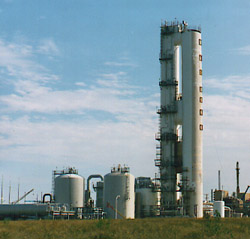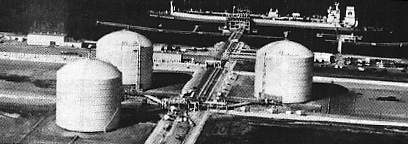WHAT IS PERLITE?
Perlite is not a trade name but a generic term for naturally occurring siliceous volcanic rock. The distinguishing feature which sets perlite apart from other volcanic glasses is that when heated to a suitable point in its softening range, it expands from four to twenty times its original volume.
This expansion process is due to the presence of two to six percent combined water in the crude perlite rock. When quickly heated to above 1600 F (870 C) the crude rock pops in a manner similar to popcorn as the combined water vaporizes and creates countless tiny bubbles in the softened glassy particles. It is these tiny glass-sealed bubbles which account for the amazing lightweight and other exceptional physical properties of expanded perlite.
The expansion process also creates one of perlite's most distinguishing characteristics: its white color. While the crude perlite rock may range from transparent to light gray to glossy black, the color of expanded perlite ranges from snowy white to grayish white.
Expanded perlite can be manufactured to weigh from 2 lbs/ft3 (32 kg/m3) to 15 lb/ft3 (240 kg/m3) making it adaptable for numerous uses, including filtration, horticultural applications, insulation, inert carriers and a multitude of filler applications.

|
Cryogenic Applications for Perlite Insulation
Because of its unique properties, perlite insulation has found wide acceptance in the insulating of cryogenic and low temperature storge tanks, in shipping containers, cold boxes, test chambers, and in food processing.
Storage temperatures of -150 F (-100 C) and below are considered cryogenic. Storage tempratues of -150 F (-100 C) and above to 40 F (4 C) are considered low temperature. Super cold or extremely cold cryogenic fluids such as hydrogen and helium are normally stored in spherical, double walled vessels with evacuated annual spaces using evacuated perlite.
Properties of Perlite Insulation
Perlite insulation suitable for nonevacuated cryogenic or low temperature use exhibits low thermal conductivity throughout a range of densities, however, the normal recommended density range is 3 to 4.5 lbs/ft3 (48 to 72 kg/m3). In addition to its excellent thermal properties, perlite insulation is relatively low in cost, easy to handle and install, and does not shrink, sell, warp, or slump. Perlite is noncombustible, meets fire regulations, and can lower insurance rates. Because it is an inorganic material, it is rot and vermin proof. As a result of its closed cell structure, the material does not retain moisture.
| NONEVACUATED PERLITE CRYOGENIC AND LOW TEMPERATURE INSULATION SPECIFICATIONS | ||
| Density | 3 to 6 lb./ft3 | |
| Sieve Analysis in Percent Weight Retained (Mesh is U.S.Standard) |
Max. 10% + 16 mesh (1.18 mm) Min. 50% + 100 mesh (0.15 mm) | |
| Thermal Conductivity*: Low Temperature Applications
(at mean temperature -40 F or -40 C) | 0.24-0.27 Btu.in/h.ft3.F (0.035-0.039 W/m. K) | |
| Thermal Conductivity*: Nonevacuated Cryogenic Applications
(at mean temperature -195 F or -126 C) | 0.17-0.20 Btu.in/h.ft3.F (0.025-0.029 W/m. K) | |
and conductivity of the gas which fills the annulus or insulation space.
